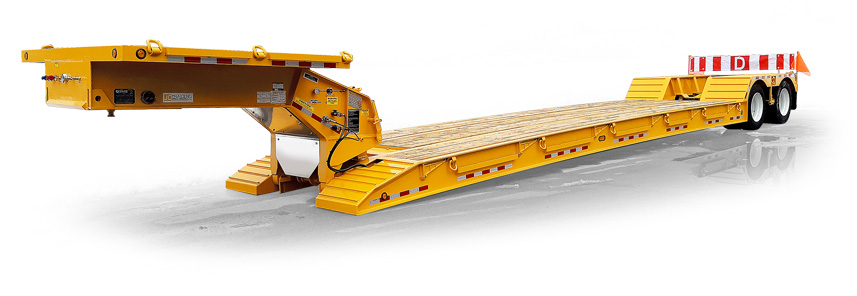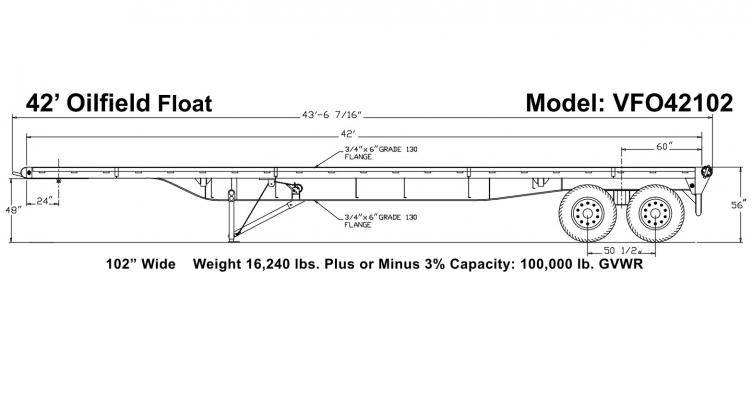A float trailer is a heavy-duty trailer designed to transport large, oversized loads. It features a low deck for easier loading and unloading.
Float trailers are essential in industries like construction and agriculture. They handle heavy machinery, vehicles, and large equipment. With a low deck, these trailers offer stability and safety. They come in various sizes and capacities to meet specific needs. Durable materials and robust construction ensure longevity and reliability.
Businesses rely on float trailers for efficient and secure transport. Choosing the right float trailer can enhance operational efficiency. Proper maintenance is crucial for optimal performance. By investing in a quality float trailer, companies can streamline logistics and reduce downtime.
Introduction To Float Trailers
Float trailers are special types of trailers. They help in carrying heavy loads. These trailers have a flat surface. This surface is for easy loading and unloading. Many industries use float trailers. These include construction and transport. Float trailers are strong and durable. They can carry heavy equipment and machinery. The design of these trailers is simple. But, they are very effective.
Float trailers have a flat deck. This deck is at a low height. This makes loading easy. The trailers have strong axles. These axles can support heavy weights. Float trailers come in different sizes. Some trailers have ramps. Ramps help in easy loading of vehicles. Others have winches. Winches pull heavy items onto the trailer.
Float trailers are important in heavy haulage. They carry large and heavy items. Without them, moving big equipment is hard. Many industries rely on these trailers. Construction sites need them for moving machinery. Farmers use them for transporting large vehicles. They save time and effort. Businesses can work faster with float trailers.
Design Features Of Float Trailers
Float trailers have strong frames. These frames help carry heavy loads. Strong axles support the trailer. They make sure it stays balanced. Hydraulic systems are often used. These systems make loading easier. Ramps are also important. They help in moving vehicles on and off the trailer. Tie-down points secure the load. They prevent movement during travel.
High-strength steel is commonly used. This steel resists bending and breaking. Aluminum is another material. It is light and strong. Protective coatings are applied. These coatings prevent rust and corrosion. Reinforced tires add to the durability. They handle rough roads well. Advanced welding techniques are used. They make the joints strong and long-lasting.
Types Of Float Trailers
Lowboy trailers have a low bed. This helps carry tall loads. These trailers can go under bridges easily. Drop deck trailers have two levels. The front is higher than the back. This design allows for taller cargo in the back. Both types are great for heavy equipment.
Extendable trailers can stretch out. This helps with long items. They can carry things like pipes or beams. Multi-axle trailers have extra wheels. These wheels help carry very heavy loads. More axles mean more weight support. Both types offer special benefits.

Credit: gincor.com
Functionality And Performance
A float trailer has a high load capacity. It can carry heavy machinery and large items. The weight distribution is important for safe transport. Axles and wheels help in spreading the load evenly. This reduces stress on the trailer. Proper load distribution prevents tipping and accidents. Always check the manufacturer’s guidelines for load limits.
A float trailer is easy to maneuver on the road. The steering system is designed for smooth turns. Hydraulic brakes provide better control. Wide tires ensure stability. Suspension systems absorb shocks. This makes the ride comfortable. Proper maintenance ensures better performance. Safety checks are necessary before every trip.
Applications In Various Industries
A float trailer transports heavy machinery and oversized loads across various industries. Its robust design ensures safe and efficient cargo handling. This versatile equipment is essential in construction, agriculture, and logistics, providing vital support for large-scale operations.
Construction And Infrastructure
Float trailers are vital in construction. They transport heavy machinery. These include excavators and bulldozers. They make work easier and faster. Roads and bridges need these trailers. They carry large materials safely. Construction sites rely on them daily. They save time and reduce costs. Workers can depend on their strength and durability.
Agriculture And Forestry
Farmers use float trailers for many tasks. They transport heavy farming equipment. Forestry workers also depend on these trailers. They move logs and large tools. These trailers can handle rough terrains. They ensure safe and fast transport. Agricultural productivity increases with their help. They are essential for modern farming.
Loading And Unloading Mechanisms
A float trailer simplifies the process of transporting heavy machinery. Its design ensures smooth loading and unloading. This trailer type is essential for construction and agricultural industries.
Hydraulic Systems
Hydraulic systems help lift heavy loads. They use fluid pressure for this task. This makes loading easy and safe. Hydraulic ramps can adjust their height. This helps to match the height of different vehicles. Hydraulic systems are reliable and efficient. They work even in tough conditions.
Safety Protocols
Always follow safety protocols during loading and unloading. Wear safety gear like gloves and helmets. Inspect the equipment before use. This ensures everything works fine. Secure the load properly with straps and chains. Check for any loose parts. Safety checks prevent accidents and injuries. Always stay alert while working.
Maintenance And Safety Considerations
Regular checks keep float trailers in good shape. Always check tires and brakes for wear. Ensure all lights and signals work well. Lubricate moving parts to avoid rust. Clean the trailer often to remove dirt. Inspect the hitch and safety chains. Fix any problems quickly to prevent accidents. Check the weight limits to ensure safety. Examine the wiring and connections regularly. Ensure emergency equipment is in place and functioning.
Float trailers must follow transport laws. Keep all permits and licenses up to date. Understand the road rules for towing. Ensure the load is secure and balanced. Follow the speed limits for trailers. Display the correct signage on your trailer. Check that the trailer meets safety standards. Train drivers on proper towing techniques.
Technological Advancements
Telematics helps track trailers in real-time. This technology uses GPS and sensors. Fleet managers can monitor the location and status of each trailer. Alerts are sent for any issues or delays. This ensures timely deliveries and reduces downtime. Tracking helps in theft prevention. It also aids in route optimization. Drivers get real-time updates and instructions. This improves efficiency and safety on the road.
New materials make trailers lighter and stronger. This allows for more cargo without compromising safety. Aerodynamic designs reduce fuel consumption. This saves money and helps the environment. Modular designs offer flexibility. Trailers can be customized for different loads. This adaptability is useful for various industries. Enhanced suspension systems provide a smoother ride. This protects both the cargo and the trailer. Smart features improve maintenance schedules. Sensors alert drivers to potential issues. This prevents breakdowns and extends the trailer’s lifespan.
Choosing The Right Float Trailer
Understand your requirements first. Consider the weight of the items you need to transport. Check the size of the trailer you need. Think about the terrain you will travel on. Look at the frequency of use. Make a list of these points. Knowing your needs helps in choosing the right trailer.
Compare the cost of different trailers. Look at the benefits each one offers. A higher price might mean better quality. Check the durability and maintenance costs. Consider the resale value of the trailer. Weigh these factors before making a decision. A well-chosen trailer saves money in the long run.

Credit: en.wikipedia.org
Case Studies: Float Trailers In Action
Float trailers help move heavy equipment. They are used in construction and farming. One farmer used a float trailer to transport a big tractor. He saved time and money. No need for multiple trips or special permits. Another case involved a construction company. They moved a large excavator easily. It made their job faster and safer.
In some cases, there are challenges. Sometimes, roads are too narrow. Drivers need to plan their route carefully. Another challenge is weather. Rain can make roads slippery. This makes it hard for float trailers. Despite these issues, float trailers are very helpful. They solve many transport problems.
One successful story comes from a mining company. They moved a huge drill machine. The float trailer handled it well. Workers were impressed. Another success involved a car show. Multiple classic cars were moved safely. The float trailer protected them.
Challenges still exist. One driver faced a steep hill. He had to drive slowly. Another problem is fuel cost. Float trailers use a lot of fuel. This can get expensive. But the benefits outweigh the challenges. Many people and businesses rely on float trailers.

Credit: www.vikingspzdtrailers.com
Frequently Asked Questions
What Is A Float Type Trailer?
A float type trailer is a flatbed trailer designed to transport heavy or oversized loads. It features a low deck for easy loading and unloading.
What Is An Oilfield Float Trailer?
An oilfield float trailer is a specialized flatbed trailer. It transports heavy equipment and machinery in oilfields.
What Is The Purpose Of A Float Truck?
A float truck transports heavy, oversized, or irregularly shaped loads. It offers stability and flexibility for large cargo.
What Is A Mini Float Trailer?
A mini float trailer is a small, versatile trailer designed for transporting lightweight equipment or small vehicles. It features a flatbed for easy loading and unloading. Ideal for landscaping, farming, and recreational use, it offers convenience and flexibility.
Conclusion
A float trailer offers versatile solutions for transporting heavy equipment and vehicles. They ensure safe, efficient transport with ease. Understanding their features can help you choose the right one for your needs. Investing in a float trailer can greatly enhance your hauling capabilities.
Make an informed decision to boost productivity and efficiency.

